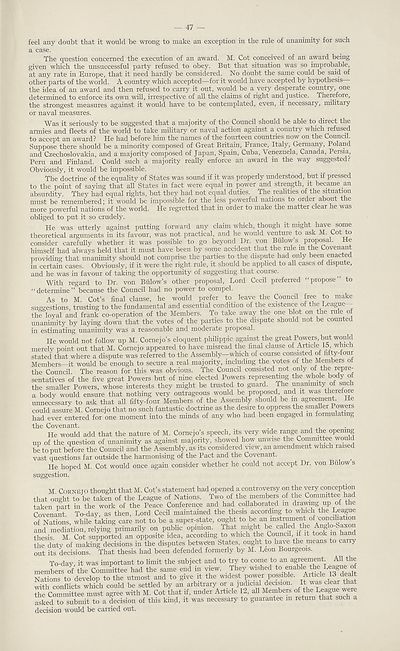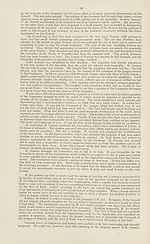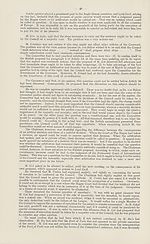Legal > Committee for the amendment of the Covenant of the League of Nations in order to bring it into harmony with the pact of Paris
(51)
Download files
Complete book:
Individual page:
Thumbnail gallery: Grid view | List view

— 47 —
feel any doubt that it would be wrong to make an exception in the rule of unanimity for such
a case.
The question concerned the execution of an award. M. Cot conceived of an award being
given which the unsuccessful party refused to obey. But that situation was so improbable,
at any rate in Kurope, that it need hardly be considered. No doubt the same could be said of
other parts of the world. A country which accepted—for it would have accepted by hypothesis
the idea of an award and then refused to carry it out, would be a very desperate country, one
determined to enforce its own will, irrespective of all the claims of right and justice. Therefore,
the strongest measures against it would have to be contemplated, even, if necessary, military
or naval measures.
Was it seriously to be suggested that a majority of the Council should be able to direct the
armies and fleets of the world to take military or naval action against a country which refused
to accept an award? He had before him the names of the fourteen countries now on the Council.
Suppose there should be a minority composed of Great Britain, b ranee, Italy, Germany, Poland
and Czechoslovakia, and a majority composed of Japan, Spain, Cuba, Venezuela, Canada, Persia,
Peru and Finland. Could such a majority really enforce an award in the way suggested.
Obviously, it would be impossible.
The doctrine of the equality of States was sound if it was properly understood, but if pressed
to the point of saying that all States in fact were equal in power and strength, it became .an
absurdity. They had equal rights, but they had not equal duties. The realities of the situation
must be remembered; it would be impossible for the less powerful nations to order about the
more powerful nations of the world. He regretted that in order to make the matter clear he was
obliged to put it so crudely.
He was utterly against putting forward any claim which, though it might have some
theoretical arguments in its favour, was not practical, and he would venture to ask M. Cot to
consider carefully whether it was possible to go beyond Dr. von Billow s. proposal. He
himself had always held that it must have been by some accident that the rule m the Covenant
providing that unanimity should not comprise the parties to the dispute had only been enac e
in certain cases. Obviously, if it were the right rule, it should be applied to all cases of dispute,
and he was in favour of taking the opportunity of suggesting that course.
With regard to Dr. von Billow’s other proposal, Lord Cecil preferred “proPose” to
“determine” because the Council had no power to compel.
As to M. Cot’s final clause, he would prefer to . leave the Council free to make
suggestions trusting to the fundamental and essential condition of the existence of the Be ague—-
the loyal and frank co-operation of the Members. To take away the one blot on the rule of
unanimity by laying down that the votes of the parties to the dispute should not be counted
in estimating unanimity was a reasonable and model ate proposal.
He would not follow up M. Cornejo’s eloquent philippic against the great Powers, but would
merely point out that M. Cornejo appeared to have misread the final clause of Article 15 which
stated that where a dispute was referred to the Assembly—which of course consisted of fifty-four
Members—it would be enough to secure a real majority, including the votes of the Members o
the Council. The reason for this was obvious. The Council consisted not only of the repre¬
sentatives of the five great Powers but of nine elected Powers representing the whole body of
the smaller Powers, whose interests they might be trusted to guard. I he unanimity of such
a body would ensure that nothing very outrageous would be proposed, and it was theielore
unnecessary to ask that all fifty-four Members of the Assembly should be m agreement. He
could assure M. Cornejo that no such fantastic doctrine as the desire to oppress the smaller Powers
had ever entered for one moment into the minds of any who had been engaged m formulating
the Covenant.
He would add that the nature of M. Cornejo’s speech, its very wide range and the opening
up of the question of unanimity as against majority, showed how unwise the Committee won d
be to put before the Council and the Assembly, as its considered view, an amendment which raised
vast questions far outside the harmonising of the Pact and the Covenant. >
He hoped M. Cot would once again consider whether he could not accept Dr. von Bii ow s
suggestion.
M Cornejo thought that M. Cot’s statement had opened a controversy on the very conception
that ought to be taken of the Deague of Nations. Two of the members of the Committee had
taken part in the work of the Peace Conference and had collaborated m drawing up of the
Covenant To-day, as then, Bord Cecil maintained the thesis according to which the Beague
of Nations, while taking care not to be a super-state, ought to be an instrument of conciliation
and mediation relying primarily on public opinion. That might be called the Anglo-Saxon
thesis M. Cot supported an opposite idea, according to which the Council if it took m and
the duty of making decisions in the disputes betwe'en States, ought to have the means to carry
out its decisions. That thesis had been defended formerly by M. Been Bourgeois.
To-day, it was important to limit the subject and to try to come to an agreement. All the
members of the Committee had the same end in view. _ They wished to enable the Be ague o
Nations to develop to the utmost and to give it the widest power possible. Article 13 dealt
with conflicts which could be settled by an arbitrary or a judicial decision. It was clear that
the Committee must agree with M. Cot that if, under Article 12, all Members of the Beague were
asked to submit to a decision of this kind, it was necessary to guarantee m return that such a
decision would be carried out.
feel any doubt that it would be wrong to make an exception in the rule of unanimity for such
a case.
The question concerned the execution of an award. M. Cot conceived of an award being
given which the unsuccessful party refused to obey. But that situation was so improbable,
at any rate in Kurope, that it need hardly be considered. No doubt the same could be said of
other parts of the world. A country which accepted—for it would have accepted by hypothesis
the idea of an award and then refused to carry it out, would be a very desperate country, one
determined to enforce its own will, irrespective of all the claims of right and justice. Therefore,
the strongest measures against it would have to be contemplated, even, if necessary, military
or naval measures.
Was it seriously to be suggested that a majority of the Council should be able to direct the
armies and fleets of the world to take military or naval action against a country which refused
to accept an award? He had before him the names of the fourteen countries now on the Council.
Suppose there should be a minority composed of Great Britain, b ranee, Italy, Germany, Poland
and Czechoslovakia, and a majority composed of Japan, Spain, Cuba, Venezuela, Canada, Persia,
Peru and Finland. Could such a majority really enforce an award in the way suggested.
Obviously, it would be impossible.
The doctrine of the equality of States was sound if it was properly understood, but if pressed
to the point of saying that all States in fact were equal in power and strength, it became .an
absurdity. They had equal rights, but they had not equal duties. The realities of the situation
must be remembered; it would be impossible for the less powerful nations to order about the
more powerful nations of the world. He regretted that in order to make the matter clear he was
obliged to put it so crudely.
He was utterly against putting forward any claim which, though it might have some
theoretical arguments in its favour, was not practical, and he would venture to ask M. Cot to
consider carefully whether it was possible to go beyond Dr. von Billow s. proposal. He
himself had always held that it must have been by some accident that the rule m the Covenant
providing that unanimity should not comprise the parties to the dispute had only been enac e
in certain cases. Obviously, if it were the right rule, it should be applied to all cases of dispute,
and he was in favour of taking the opportunity of suggesting that course.
With regard to Dr. von Billow’s other proposal, Lord Cecil preferred “proPose” to
“determine” because the Council had no power to compel.
As to M. Cot’s final clause, he would prefer to . leave the Council free to make
suggestions trusting to the fundamental and essential condition of the existence of the Be ague—-
the loyal and frank co-operation of the Members. To take away the one blot on the rule of
unanimity by laying down that the votes of the parties to the dispute should not be counted
in estimating unanimity was a reasonable and model ate proposal.
He would not follow up M. Cornejo’s eloquent philippic against the great Powers, but would
merely point out that M. Cornejo appeared to have misread the final clause of Article 15 which
stated that where a dispute was referred to the Assembly—which of course consisted of fifty-four
Members—it would be enough to secure a real majority, including the votes of the Members o
the Council. The reason for this was obvious. The Council consisted not only of the repre¬
sentatives of the five great Powers but of nine elected Powers representing the whole body of
the smaller Powers, whose interests they might be trusted to guard. I he unanimity of such
a body would ensure that nothing very outrageous would be proposed, and it was theielore
unnecessary to ask that all fifty-four Members of the Assembly should be m agreement. He
could assure M. Cornejo that no such fantastic doctrine as the desire to oppress the smaller Powers
had ever entered for one moment into the minds of any who had been engaged m formulating
the Covenant.
He would add that the nature of M. Cornejo’s speech, its very wide range and the opening
up of the question of unanimity as against majority, showed how unwise the Committee won d
be to put before the Council and the Assembly, as its considered view, an amendment which raised
vast questions far outside the harmonising of the Pact and the Covenant. >
He hoped M. Cot would once again consider whether he could not accept Dr. von Bii ow s
suggestion.
M Cornejo thought that M. Cot’s statement had opened a controversy on the very conception
that ought to be taken of the Deague of Nations. Two of the members of the Committee had
taken part in the work of the Peace Conference and had collaborated m drawing up of the
Covenant To-day, as then, Bord Cecil maintained the thesis according to which the Beague
of Nations, while taking care not to be a super-state, ought to be an instrument of conciliation
and mediation relying primarily on public opinion. That might be called the Anglo-Saxon
thesis M. Cot supported an opposite idea, according to which the Council if it took m and
the duty of making decisions in the disputes betwe'en States, ought to have the means to carry
out its decisions. That thesis had been defended formerly by M. Been Bourgeois.
To-day, it was important to limit the subject and to try to come to an agreement. All the
members of the Committee had the same end in view. _ They wished to enable the Be ague o
Nations to develop to the utmost and to give it the widest power possible. Article 13 dealt
with conflicts which could be settled by an arbitrary or a judicial decision. It was clear that
the Committee must agree with M. Cot that if, under Article 12, all Members of the Beague were
asked to submit to a decision of this kind, it was necessary to guarantee m return that such a
decision would be carried out.
Set display mode to:
![]() Universal Viewer |
Universal Viewer | ![]() Mirador |
Large image | Transcription
Mirador |
Large image | Transcription
Images and transcriptions on this page, including medium image downloads, may be used under the Creative Commons Attribution 4.0 International Licence unless otherwise stated. ![]()
| League of Nations > Legal > Committee for the amendment of the Covenant of the League of Nations in order to bring it into harmony with the pact of Paris > (51) |
|---|
| Permanent URL | https://digital.nls.uk/191509475 |
|---|
| Shelfmark | LN.V |
|---|
| Description | Over 1,200 documents from the non-political organs of the League of Nations that dealt with health, disarmament, economic and financial matters for the duration of the League (1919-1945). Also online are statistical bulletins, essential facts, and an overview of the League by the first Secretary General, Sir Eric Drummond. These items are part of the Official Publications collection at the National Library of Scotland. |
|---|---|
| Additional NLS resources: |
|

